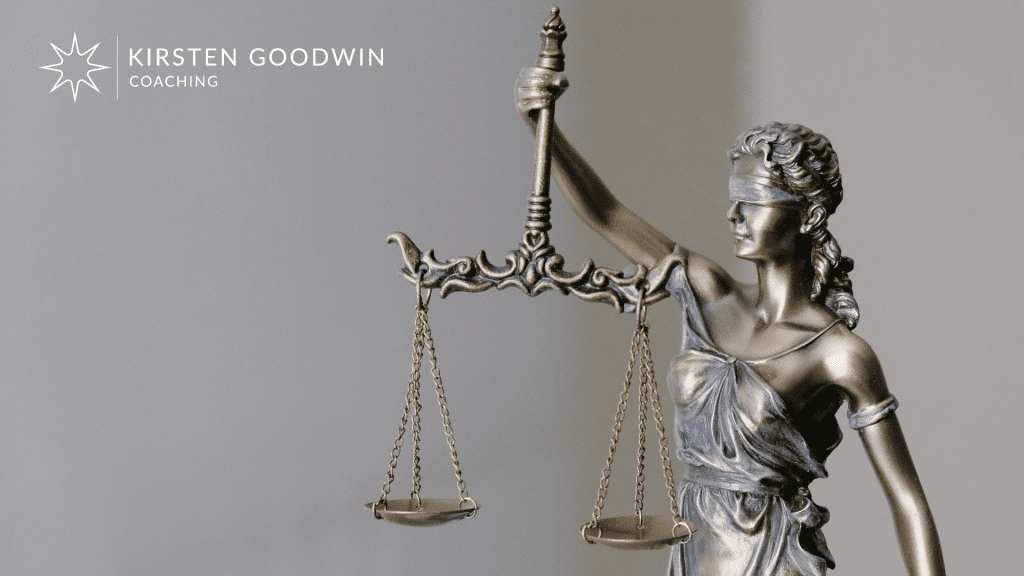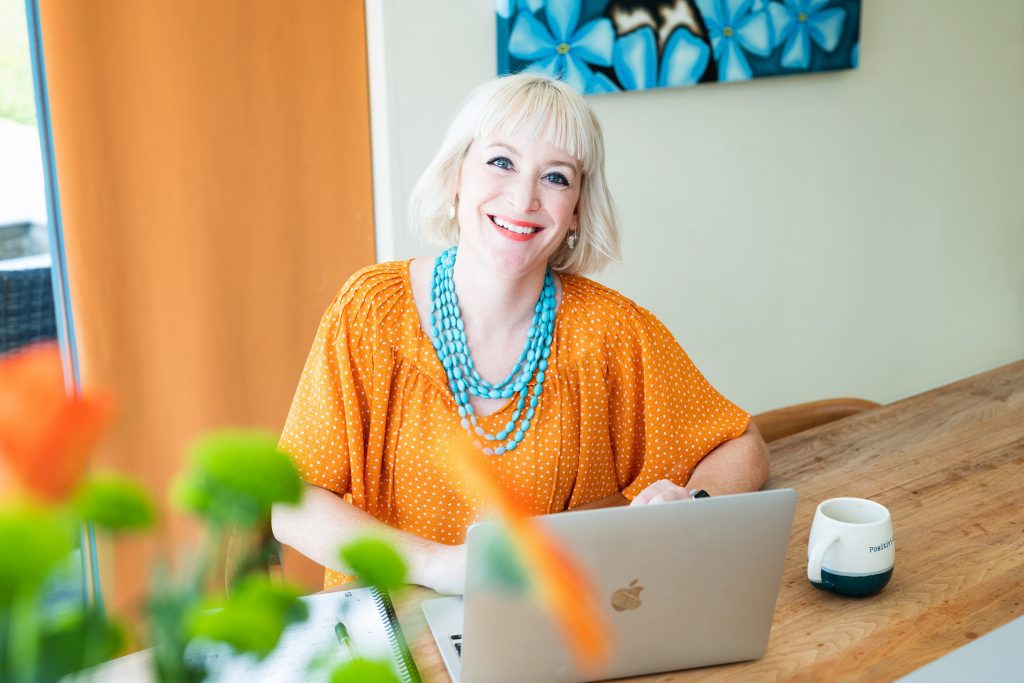One symptom of Imposter Syndrome is that we are full of judgement of ourselves.
All that critical self-talk is deeply undermining.
❌ It makes us feel as if we’re not good enough.
❌ It makes us fear making mistakes.
❌ And ultimately it burdens our systems with terrible extra layers of stress and anxiety, eroding our physical and mental wellbeing.
But actually being judgemental is a very common thing.
As humans, we spend a lot of time in judgement of other people.
In this blog post, I talk about:
- the evolutionary reasons for this
- how these judgements aren’t necessarily conscious
- how (in those suffering from Imposter Syndrome) these judgments have been turned inwards
- and crucially, what to do about it!
Why we judge others – evolutionary reasons
In his amazing book “Sapiens”, Yuval Noah Harari talks about how humans have developed so successfully as a species because of our ability to form collaborative, mutually-supportive groups.
If each person in the group has to do every job – find food and water, tend animals and crops, look after children – it is a very inefficient way to operate.
But if we can share jobs out – so if I tend the animals today, you will fetch the water for me – we are all more successful.
In a study undertaken at Cardiff University, researchers modelled how this kind of reciprocal society might work. As one of the authors said,
“Our results suggest that the evolution of cooperation, which is key to a prosperous society, is intrinsically linked to the idea of social comparison – constantly sizing each other up and making decisions as to whether we want to help them or not.”
In fact, they suggest that one reason our brains might be so much bigger than apes’ is because of the extra processing power needed to successfully operate like this in larger and more complex societies.
So this process of sizing other people up and making judgements about them is intrinsic to our biology, and our success as a species.
It’s also worth noting that these judgments are often unconscious.
We can process in two ways:
- with our logical brain, where we are conscious of the thoughts we have;
- and with our reflexive brain, which makes judgement for us based on previous programming.
(In fact, this reflexive brain can be a source of unconscious racial or gender bias, where we don’t believe we make judgments about people based on race or gender but actually our reflexive brain is doing it, programmed by the cultural inputs we’ve had growing up.)
So we are programmed to make judgements all the time – and we might not even be aware we’re doing it.
Why we judge others – emotional reasons
Think of The Plastics in the film “Mean Girls”: they spent their time judging others as being not as good as them.
This has a number of sources:
❗️by putting down others it made them feel better about themselves
❗️it was also a way of dealing with fear of something different
❗️and it created a bond between them, as they banded together in opposition to those they were judging (the classic “us and them”).
Feeling scared or insecure, or wanting safety in belonging, are all very normal feelings.
You can understand why we are judgemental of others – because on the surface it is addressing these painful feelings (and humans have an extraordinarily powerful urge to remove ourselves from sources of pain).
But this judgement of others is dangerous.
It creates divisions between people, it can lead to unconscious prejudice, and fundamentally, it makes us unhappy.
Because if we spend our time in judgement of others (perhaps because of our own lack of self-worth), we are reinforcing that pattern of thinking against ourselves.
The power of neuroplasticity in the brain means the more you think a thought, the more likely you are to think that thought in the future.
Excessive judgement of others goes hand in hand with excessive self-judgement.
And this can manifest as Imposter Syndrome.
What you can do about it
We can change our thoughts, and minimise the negative impacts of judgement.
There are three key steps to this:
1. Self-awareness
The first step is always self-awareness.
When you are aware of the thought patterns you are running (like programmes whirring away automatically on a computer), you are able to CHANGE them.
So choose to notice your thoughts.
Notice when you have judgemental thoughts about others or yourself. Then…
2. Change your language
A clue that you are running patterns of judgement is the “tyrannical should” – any statement that you make about yourself or others that includes a “should” (or “shouldn’t”) usually includes a judgement.
❌ I SHOULD have done that differently.
❌ They SHOULDN’T have said that.
❌ You SHOULD know better.
“Should” is such a deeply critical, and disempowering word. I urge all my clients to eradicate it from their vocabulary.
Instead, replace it with “could”, or “choose”, or “would like”:
✅ I would like to have done that differently
✅ They could have chosen to say something else.
✅ You could choose to do something else instead.
Suddenly these are options, or choices, rather than a stick to beat yourself (or others) up with.
3. Move from “personality” to “situational” judgements
When we are in judgment of someone for their behaviour, there are two types of judgement we can make: situational, or personality.
- A personality judgement: “she was late for dinner because she didn’t really want to see me”.
- A situational judgement: “she was late for dinner because she had a last minute childcare crisis”.
So often we jump to the personality judgements, without allowing room for the possibility that there might be a genuine situational reason.
And personality judgements are much more dangerous, because they indicate something long-lasting, rather than a momentary combination of events.
Worryingly we do this to ourselves too!
This is where Imposter Syndrome comes in:
- A personality judgement: “I dropped that ball because I’m not good enough” (I am the problem, permanently)
- A situational judgement: “I dropped that ball because it was a particularly busy week and I also didn’t have any help because my assistant was off sick” (the situation is the problem, temporarily)
So notice how your frame the judgements you are making in your head.
Are you going straight for the personality judgement, or are you giving the benefit of the doubt (to yourself, or them), with a situational judgement?
Again, this is a very freeing technique.
You are taking yourself out of the equation, making it about the context rather than personal to you.
It takes away the power of the judgement to wound yourself, others, or your relationship with them.
(And it’s usually the accurate reason anyway!)
Conclusion
So there are very good, human reasons for judging others.
But as the amazing intelligent, sapient creatures we are, we can choose whether these judgements have a positive or negative impact on us.
Judgements that come from a place of insecurity or fear will be unhelpful to us.
Unconscious judgements that we don’t recognise or interrogate will be unhelpful to us, and can be deeply damaging to others (like with unconscious racial or gender bias).
And any form of self-judgement will be unhelpful to us, triggering or exacerbating Imposter Syndrome.
I believe so strongly that we can choose the thoughts that we allow to take root in our heads.
The brain is not always our friend, programmed as it is to keep us alive through years of evolution but not necessarily to keep us happy in this modern world.
Thoughts will come and go.
So:
🔥 recognise your thoughts.
🔥 choose the ones you allow to stay.
🔥 and choose to gently let go of the ones that are unhelpful to you, reframing them as I suggest above.
Show yourself and others kindness and compassion, like you would your child, or your best friend.
Over time, the more you do this, with the power of neuroplasticity, it will get easier.
Get help
If you’d like more support with building this compassion muscle, my loving kindness meditation will help, through teaching you how to direct loving kindness towards yourself and others.
You can download it here.
If you’d like 1:1 coaching support to help you banish your Imposter and build your Naked Confidence™ (that confidence that is already in you, deep down, just covered up with that negative critic and limiting beliefs) – then get in touch.
You can book a free 45 minute into call where you’ll get to experience my transformational tools through emailing me on kirsten@kirstengoodwin.co.uk or booking into my calendar here.
Wishing you a positive, productive and Nakedly Confident week! 😊💪🔥
with love 💖
Kirsten xx
p.s. don’t forget you can download my loving kindness meditation here.
p.p.s. you can book your free intro call here 😊





